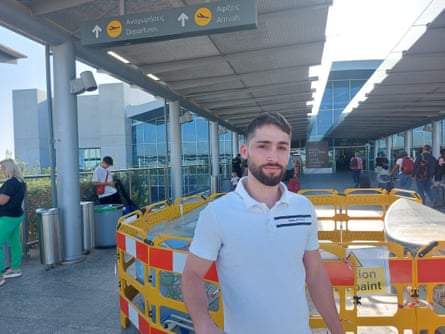In quieter times, the four-storey building that houses the Jewish community centre in the heart of Larnaca is an oasis of peace.
If visitors drop by, it is usually to pray, enjoy the centre’s kosher food, or learn more about the British-run detention camps in which over 53,000 Holocaust survivors were interned on Cyprus between 1946 and early 1949, when the last 10,000 were evacuated to the new Israeli state.
But these days, as the go-to place for thousands fleeing the country following the October 7 Hamas attack, the centre has gone into crisis mode, its corridors and recreation spaces teeming with evacuees, some young, some old, but all bonded by a common desire to seek solace on an island barely a 40-minute flight away.
“Around 1,000 people are arriving every day,” said Arie Zeev Raskin, the island’s chief rabbi, in his book-lined office at the centre. “More than 16,000 people have now arrived in Cyprus in search of peace of mind since that terrible day,” he said of the unprecedented incursion by Gaza-based Islamist militants that would see 1,200 people die, over 240 taken hostage and propel the region into renewed bloodshed.
“There are single mothers, traumatised children, people who can’t cope with the sound of rockets going off every day. We offer them whatever we can, be that a bed, food, temporary accommodation.”
In the month that has elapsed since the conflict erupted, ever more families have reached Cyprus, many spurred by fear of reprisals in the wake of the Israeli military’s ferocious counter-attack against Hamas in Gaza, an offensive that has so far killed more than 11,000 Palestinians, according to the Hamas-run health ministry, and left countless wounded.
But Rashi, who first settled on the island when popular sentiment was decidedly more pro-Palestinian, said the Israeli arrival was not all in one direction. Foreign-based reservists responding to Benjamin Netanyahu’s call to arms had also transited through Cyprus as they headed the other way.
“We’ve had young men, young Jewish reservists from the likes of Argentina, show up,” said the rabbi, reaching for his snuff box. “I could write a book about what I have seen, acts of incredible generosity from Cypriot people, acts I have not seen in all of these last 20 years put together.”
Others seeking release are also flying in. “We needed to get away from all the noise, the rockets, the fighting, so me and my friends flew over to spend five days in Ayia Napa,” said Israel Pertz, aged 23, referring to the resort in the island’s south as he waited to board a flight back home at Larnaca airport. “We feel safe here.”

It is not only Israelis who in recent weeks have arrived in Cyprus.
Amid mounting fears of the conflagration spreading, western embassies in Nicosia, the nation’s war-split capital, have also been on an emergency footing in anticipation of the strategic Mediterranean island once again becoming an evacuation hub and nerve centre for the distribution of humanitarian aid. In 2006, the EU’s most easterly member state acted as a transit point for over 30,000 foreign nationals fleeing war in Lebanon, a role reprised when thousands of British passport holders were airlifted from Sudan to the country earlier this year.
The foreign minister, Constantinos Kombos, has raised the spectre of more than 100,000 people being evacuated to Cyprus from Lebanon, and other parts of the region, in the event of the conflict escalating. Addressing MPs, he said over 1,000 men, women and children from 35 countries had been brought to the island since 7 October.
SAS troops and other special forces from Germany and the Netherlands have been placed on standby in military bases that the UK retains in its former colony. The elite teams are believed to specialise in hostage rescue missions.
after newsletter promotion
“Cyprus has proved to be a safe haven, the eye of the storm when the region elsewhere is in flames,” said professor Hubert Faustmann, who teaches history and political science at the University of Nicosia. “But the game changer could be if large numbers of refugees from Syria and Lebanon flee to Cyprus, are not accepted by other EU member states, and ultimately get stuck here. Real war could bring real chaos to the island.”
Like Athens, Nicosia’s approach was for years more pro-Arab than pro-Israeli. A sea change prompted by deteriorating relations between Israel and Turkey, and the discovery of gas reserves off the Israeli coast, has since paved the way for closer ties and an energy alliance that has gone from strength to strength.
The Cypriot president, Nikos Christodoulides, and the Greek prime minister, Kyriakos Mitsotakis, were quick to decry the Hamas attacks while publicly supporting Israel’s right to self-defence.
But the two leaders have also sought to strike a diplomatic balance. Increasingly, Mitsotakis has expressed alarm over the extent to which innocent civilians have been killed, injured or displaced by the Israeli bombardment of Gaza. Christodoulides has proposed that Cyprus set up a humanitarian sea corridor to the beseiged coastal strip with the aim of shipping “a sustained, secure, high-volume flow of humanitarian assistance to Gaza in the immediate, medium and long term”.
Officials say shipments could be dispatched from Limassol, the country’s main port, to Gaza, just 255 miles away, as soon as there is a pause in combat and the situation on the ground allows.
“Cyprus, by virtue of its geography, has a critical role to play,” said Ian Lesser, the Brussels-based vice-president of the German Marshall fund US, during a visit to the island on Wednesday. “If the EU is serious about becoming a more significant geopolitical actor, the major test will be here in the eastern Mediterranean.”

Emily Foster is a globe-trotting journalist based in the UK. Her articles offer readers a global perspective on international events, exploring complex geopolitical issues and providing a nuanced view of the world’s most pressing challenges.








